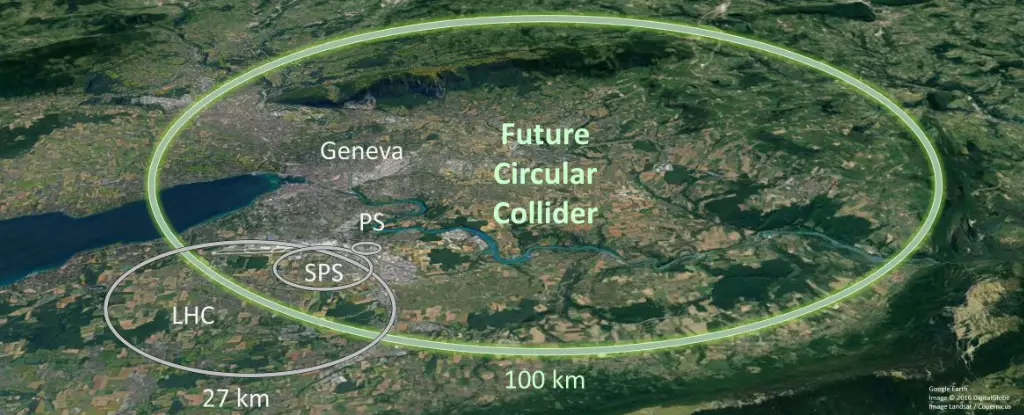CERN, the European Organization for Nuclear Research, is committed to unraveling fundamental mysteries about the universe through groundbreaking projects such as the Future Circular Collider (FCC). Announced recently, the FCC is projected to be the largest particle collider in existence, designed to outstrip the capabilities of the current Large Hadron Collider (LHC). CERN’s director, Fabiola Gianotti, affirmed that a detailed analysis has paved the way for this $17 billion initiative, with no technical hindrances reported. Yet, behind this veneer of optimism lies a labyrinth of ethical, environmental, and fiscal dilemmas that spiral into uncertainty.
The scientific community is buzzing with enthusiasm about the prospects of the FCC, lauded for its ambition to further explore significant particles and phenomena like the Higgs boson—the so-called “God particle” that altered the landscape of particle physics. This giant endeavor is presented as Europe’s pathway to maintaining its leadership in global scientific research, especially in the face of burgeoning competition from nations like China. However, the allure of progress is clouded by pressing questions about its implications.
The Showdown: Science vs. Fiscal Prudence
One of the most substantial points of contention concerning the FCC revolves around its financing. With an estimated cost of $17 billion, the project demands a level of investment that raises eyebrows even among CERN’s member states. Germany, as the largest financial contributor, has already expressed hesitation regarding the lavish expenditure required for the FCC. Critics argue that such funds could be reallocating towards smaller but impactful scientific projects that may yield results in a more accessible time frame.
This raises vital issues surrounding prioritization in scientific funding. Should society pour monumental sums into a project with uncertain outcomes, or should we aim for diversified, smaller scientific initiatives that can expedite progress across a range of disciplines? Perhaps it’s time to adopt a more cautious approach; after all, history is rife with grand scientific endeavors that failed to deliver on their lofty promises.
The Local Impact: More Than Just Numbers
Residing near CERN’s proposed construction sites are individuals and communities whose lives hinge precariously on the outcomes of such grand projects. Dairy farmer Thierry Perrillat from Roche-sure-Foron poignantly articulates how the FCC could seize a significant portion of his farmland, encapsulating a broader sentiment of distrust toward scientific endeavors that fail to account for human cost. To characterise this conflict as a mere David versus Goliath scenario belittles the severity of the situation. It illustrates a narrative of growing irrelevance for everyday citizens, forcing them to negotiate their futures in the name of scientific progress.
The consequences extend beyond immediate livelihoods. Local environmental groups, such as Noe21 and CO-CERNes, have pointed to the exorbitant energy demands and ecological backlash anticipated from the FCC. The numbers are staggering, suggesting excessive electricity consumption while the world grapples with pressing concerns of climate change. Can society afford to ‘bet’ on an uncertain project when it might significantly worsen our environmental footprint? Or, should the priorities of climate-conscious initiatives take precedence over ambitious scientific ventures?
The Ethical Dilemma: Progress vs. Responsibility
Local politicians exhibit a mixed stance toward the FCC. Some project supporters advocate the economic benefits, framing the FCC as a win-win proposition that promises employment opportunities and infrastructural improvements. Take Ferney-Voltaire’s Mayor Daniel Raphoz, for example, who argues that excess energy from CERN could even derive community benefits, such as heating local residences. While this perspective offers a glimmer of hope for community enhancement, it simultaneously risks masking the broader concerns associated with the scientific mega-project’s implications.
In moments like this, one must reflect: is economic progression feasible at the cost of community welfare and environmental sustainability? The burgeoning cost of human and ecological sacrifice asks us to reconsider the ethical dimensions of scientific pursuits. As powerful entities assert their influence over our collective future, the question of ethical responsibility becomes more crucial than ever.
CERN’s ambitious plans for the FCC are undoubtedly marked by the potential for extraordinary discoveries. Yet this ambition must not come at the expense of ethical consideration or social responsibility. We must confront the disconcerting truth that the road toward scientific enlightenment may be riddled with consequences far graver than the project’s proponents are willing to acknowledge. Progress is necessary, but at what cost?


Leave a Reply